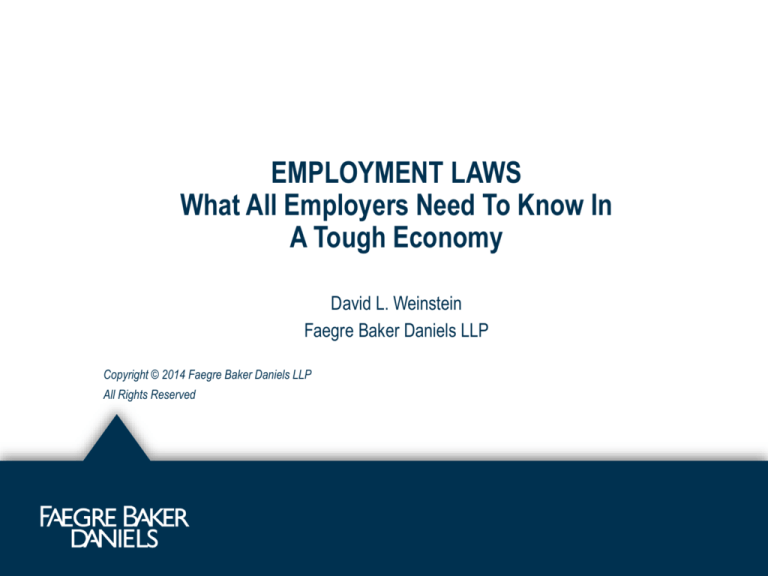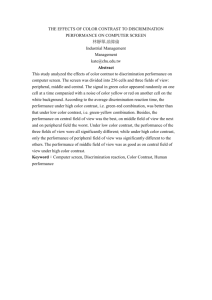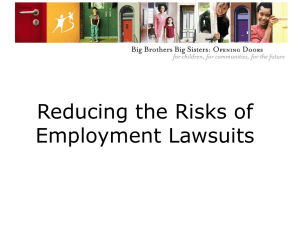
EMPLOYMENT LAWS
What All Employers Need To Know In
A Tough Economy
David L. Weinstein
Faegre Baker Daniels LLP
Copyright © 2014 Faegre Baker Daniels LLP
All Rights Reserved
Disclaimers
The information contained in this presentation is intended for general information purposes only
and should not be construed as legal advice or opinion on any particular facts or circumstances.
Managers are urged to consult an attorney with legal questions concerning specific factual
situations.
The information in this presentation has been distributed only to Company supervisors, for their
guidance. This information does not offer a contract of any kind between this Company and any
employee.
2
For-Profit v. Non-Profit Employers
There are few differences between the legal obligations of for-profit
employers and non-profit employers.
Few administrative agencies, courts, judges or juries will decide
employment claims in your company’s favor merely because of its
status as a non-profit employer
3
Most Employment Laws Governing For-Profit Employers
Apply Equally to Non-Profit Employers
“At-will” employment provides the same limited protection to both forprofit and non-profit employers.
Discrimination prohibition laws apply to small non-profit employers
(e.g., Chicago and Cook County Human Rights Ordinances apply to
employers with even 1 employee, as does Illinois Human Rights Act
[sexual harassment and disability discrimination] and Federal Civil
Rights Act of 1866).
The stakes are HIGH for your company and you.
4
Unemployment Benefits and Non-Profit Employers
Myth: Non-profit employers are not subject to the unemployment
insurance system – FALSE!
Non-profit employers can register with the Illinois Department of
Employment Security (“IDES”) to become a “reimbursable employer”
and pay the full amount of each valid claim as it is made.
Alternatively, non-profit employers can register with IDES and pay
quarterly contributions – the same as for-profit employers.
5
Workers Compensation and Non-Profit Employers
Myth: Non-profit employers are not subject to the workers
compensation system – FALSE!
Non-profit (and for-profit) employers can apply with the Illinois
Workers Compensation Commission to self-fund workers
compensation claims.
Alternatively, non-profit employers can purchase workers
compensation insurance – the same as for-profit employers.
6
Employment – The Basic Contract
Eighty years ago, the employment contract was terminable at
will by either party for any reason – or no reason at all. The courts
referred to the relationship as “employment at will.” All job duties and
conditions were unilaterally set by the employer. Employees had no
rights – beyond the agreed wages for work already performed – unless
those rights were specifically provided in an individual written contract of
employment or in a union contract. The “employment at will” contract
gave an employee only two alternatives: accept the job each day; or
quit the job.
7
In today’s workplace, the law of the employment contract has
changed dramatically. Now, courts in Illinois and other states have
found that employees may have the rights in the employment contract
including:
8
Employee’s Right To Enforce Written Publications The
Company Uses For Employees
The written materials that a company provides to its employees
may be determined by a court to create an “implied contract” between
employer and employee. Implied contracts can be avoided by properly
wording all written materials given to employees and inserting
appropriate contract disclaimers. This is primarily the concern of
persons authorizing and writing the publications, but it is an important
principle that every supervisor needs to know.
9
Employee’s Right To Enforce Oral Commitments By
Supervisors and Managers
For example, a supervisor who says to a worker “you will have a
job here as long as your work is good” may have made an oral contract
that the employee never will be discharged except for “good cause.”
That contract may be enforceable in court. So a supervisor must be
careful about oral commitments - remember they may be legally
enforceable.
10
Employee’s Right To “Good Faith And Fair Dealing”
From Supervisors
Courts in some states have said that supervisors must exercise
“good faith and fair dealing” toward employees. This means that
supervisors must deal with subordinates honestly and objectively. It
also means that any decision adverse to an employee should not be
finalized until after fair consideration of all facts which may bear on the
decision. It means that an employee suspected of misconduct never
should be disciplined or discharged without an opportunity to tell his or
her side of the story. This is not a right to escape fair punishment; it is a
right to be heard before any final decision is made.
11
Employee’s Right To Be Free Of Reprisal For Complaints
Exercising Legal Rights
So long as an employee performs the job satisfactorily, he or
she should not be punished for exercising rights created by law. For
example, an employee cannot be terminated for filing for workers’
compensation, reporting a crime, organizing with co-workers, supporting
a union or exercising any other legal right. This does not mean that an
employee can blithely absent himself or herself from work to exercise
legal rights, but as long as all work is done and work rules followed, the
exercise of legal rights is generally protected.
12
Employee’s Right To Be Free Of Defamation
Employees and former employees increasingly seek damages
because a supervisor has said something untrue about them which
hurts their reputation. While a supervisor can, and should, communicate
misconduct problems within the chain of command, he or she should not
talk about employee misconduct to anyone outside the company or to
anyone inside the company who does not need to know of the
employee’s problems. Such communication can amount to
slander - and money damages paid by both the firm and the supervisor
could be the result.
13
Employees’ Obligations
Satisfactory and Diligent Work Performance
Obedience
Loyalty
Cooperation
Business-Like Dress and Conduct
14
Discrimination – Do’s and Don’ts
Protected Categories
The first thing to understand about “discrimination” is that legally it only covers actions taken
against people because they are in certain protected categories. It means treating those people in some way
less favorably than other people not in the same category. The basic protected categories are:
a.
Race/Color
b.
National Origin/Ancestry
c.
Sex/Marital Status/Sexual Orientation
d.
Religion
e.
Age (for persons age 40 and over)
f.
Mental or physical disability not preventing performance of essential job functions
g.
Veteran status
h.
Genetic dispositions
15
Discrimination: Unequal (Disparate) Treatment
If similarly situated or equally qualified persons receive unequal
treatment because of one person’s protected characteristic, unlawful
discrimination may have occurred. For example: if a black employee
and a white employee get into a fight, and both are equally at fault,
discharging the black employee while the white employee is only
reprimanded, could constitute unlawful discrimination. Or if a Hispanic
employee is discharged for theft when a white employee, months
previously, was only reprimanded for the same kind of theft, unlawful
discrimination may have occurred.
16
Sexual Harassment
Any act or discussion, direct or indirect, involving sexual activity
may be a form of unlawful sex discrimination, known as sexual
“harassment.” This includes any unwelcome touching and verbal sexual
approaches, innuendoes or jokes.
17
Sexual Harassment
Sexual harassment can occur regardless of whether the
“harasser” is male or female, and regardless of whether the offended
person is of the opposite or the same gender as the harasser.
18
Sexual Harassment
It is also unlawful for a supervisor to fail to act to cure any
atmosphere of sexual harassment of which he or she is aware. This
does not mean all “shop talk” involving vulgarities is necessarily illegal.
But it does mean that any such words from a supervisor could lead to
liability if reasonably viewed as having unwelcome sexual connotations
by the person to whom they are directed.
19
Sexual Harassment
To avoid complications, a supervisor simply should never
engage in sexual banter with persons under his or her charge – in or
outside the workplace.
20
Discrimination: Failure To Accommodate
Disability Or Religion
Unlike the other protected categories, persons in the categories
of “disability” and “religion” have the added legal protection that the
employer and the supervisor must “reasonably accommodate” their
needs.
21
Discrimination: Accommodating Religion
As for religion, employers also must accommodate workers’
requests, so long as doing so causes only minimal disruption to the
company. For example, a person must be given time off for religious
observance if it can be done without seriously hurting the employer’s
regular business activities.
22
Discrimination: Accommodating Disabilities
A qualified disabled person must be provided (or at least offered
a) reasonable accommodation for his or her disability if that would
enable the person to do the “essential functions” of the job, and the
accommodation will not cause the company undue hardship. It also
means that the job environment must be tailored to make it possible for
qualified disabled people to work. For example, a person who suffers
from night blindness must be allowed to work an altered schedule to
avoid night driving if it can be done without undue hardship to the
employer.
23
Discrimination: Freedom From Retaliation
An employee who thinks he or she has been discriminated
against has the right to discuss the matter with his/her supervisor, other
persons in management, or a governmental agency.
24
Discrimination: Retaliation
Any retaliation for making a complaint is strictly illegal. Whether
the retaliation is obvious (such as discharging the complaining person)
or subtle (such as denying a merit increase for “uncooperativeness”), it
is illegal.
25
Discrimination: Retaliation
A complaint should not necessarily be viewed as a sign of
disloyalty. It should be taken seriously, and investigated objectively.
While it is true some complaints of discrimination are insincere, the great
majority are sincere expressions of perceived mistreatment. But even if
the complaint is insincere, retaliation still is prohibited.
26
Suggestions To Avoid Appearance Of Discrimination
Apply all rules and standards equally to everyone.
Don’t make exceptions - exceptions become rules.
Give consistent signals and candid appraisals.
The hardest case to successfully defend is a discharge for
unsatisfactory performance shortly after a “merit” increase intended to
motivate substandard performance. Such mixed signals breed
discrimination charges.
27
Suggestions To Avoid Appearance Of Discrimination
Don’t delay decisions.
Problems not immediately acted upon often imply that a bad
situation has been accepted or condoned. A delayed decision also may
look arbitrary or unfair. Further, a bad situation often gets worse and the
cure may have to be more severe.
28
Suggestions To Avoid Appearance Of Discrimination
Assume everyone wants to advance within the organization.
Supervisors sometimes assume certain employees have no
interest in advancement or better salaries because of attitudes they
appear to display. That is a bad assumption. All employees should be
considered for advancement. Choices should be made based on the
best qualifications; don’t overlook anyone because he or she “appears”
uninterested.
29
Suggestions To Avoid Appearance Of Discrimination
Give clear instructions and warnings.
Don’t ever think “he/she should have known” what was
expected. Tell everyone clearly what is expected. To hold employees to
certain rules of conduct, the rules must be made clear.
30
Suggestions To Avoid Appearance Of Discrimination
Always hear an employee’s side of the story before taking action
against him/her.
An employee should be heard before anything bad happens to
her or him by persons in authority. A supervisor should not take action
against an employee until all the facts are in. When immediate action is
required but all the facts are not known, consider a short, paid
suspension instead of more drastic action.
31
Suggestions To Avoid Appearance Of Discrimination
Avoid making decisions based on subjective “feelings” about
people – rely on objective facts.
A person’s performance in a current job is usually a good
predictor of success in an upgraded job; especially if some upgraded
tasks have been assigned to see how the person responds to the
additional responsibilities. Subjective “feelings” as to promotability are
not nearly as dependable - or as credible if a discrimination charge
contests such a decision.
32
Suggestions To Avoid Appearance Of Discrimination
Explain decisions to affected employees.
Some discrimination claims are filed because something
negative happened to an employee and nobody explained why. A
lengthy explanation is seldom required. But some explanation is almost
always appropriate. For example, an employee who knows he/she is
being considered for a promotion, but is not selected, generally should
be given some reason for the decision.
33
Sensitive Personnel Decision Points
Hiring decisions.
Are you looking objectively at each candidate? Avoiding any
stereotype assumptions? Giving each candidate the same chance to
show he/she is best for the job?
34
Sensitive Personnel Decision Points
Evaluation and performance reviews.
Are you using the same standards to evaluate everyone?
Looking at what they actually did objectively? Avoiding preconceived
opinions about their abilities? Being fully candid with them? Directly
addressing problems rather than hoping they will go away?
35
Sensitive Personnel Decision Points
Promotion considerations and decisions.
Are you considering all possible candidates? Avoiding
assumptions that certain people simply are not promotable? Talking to
others to get second opinions where needed? Discussing the new job
with all qualified candidates? Keeping an open mind until everyone has
been interviewed if you have several candidates? Saying something
positive to each unsuccessful candidate after the decision is made?
36
Sensitive Personnel Decision Points
Discipline and discharge decisions.
Are the rules clear? Are you sure you have all the facts? Did
you talk directly to “the accused” about the incident before a decision is
finalized? Check out any plausible explanation he/she has made?
Apply the same penalty for this infraction in the past? Confront the
issue directly with the employee? Avoid the inclination to be vague
about unpleasant matters - be candid and blunt? Document everything
in writing in objective language?
37
Sensitive Personnel Decision Points
Assignment and change in work content.
Are assignments - and changes - fair as to content and
complexity? People adequately trained for jobs they are expected to
do? Did you consider preferences of people before finalizing changes?
Check to see how people react to changes?
38
Recordkeeping – Documentation
Because every personnel-related decision a supervisor makes
has the potential to be attacked as discriminatory, it is essential that
good documentation be kept on facts and reasons for actions.
39
Recordkeeping – Documentation
Occurrence memos and written warnings should be narrative in
form, use objective terms to describe an incident, and avoid opinions,
conjecture and other subjective material.
40
Recordkeeping – Documentation
Memos or warnings on discipline matters should describe the
incident as close to blow-by-blow as possible. They should say what
happened, and not use adjectives to characterize the event.
41
Recordkeeping – Documentation
For example, a memo should say: “I told Sally to return to her
desk immediately and retype the letter. She said ‘I will not’ and stood in
the aisle with her arms folded.” A memo for that incident should not say:
“I gave Sally an instruction. She was insubordinate.”
42
Recordkeeping – Documentation
Memos and warnings should be kept in an employee’s official
personnel file. In Illinois and some other states, employees are entitled
to go through their personnel file and enter a response to any negative
material with which they disagree. Any request by an employee to see
his/her file should be referred immediately to the appropriate people in
personnel.
43
Recordkeeping – Documentation
Memos and warnings generally should be shown to employees
before they are put in the file. Their content should be discussed with
the employee.
44
Recordkeeping – Documentation
Performance evaluations should be filled out accurately -especially if negative things are said. Failure to identify negatives may
mislead the employee as to where he/she stands and limit the
employee’s potential to achieve satisfactory performance.
45
Recordkeeping – Documentation
Personnel files should not contain little “reminder” notes on
scratch paper. They often are only partial reports and may be
misleading. If there is a significant problem, there should be a full memo
and/or specific warning about it.
46
Questions?
47






